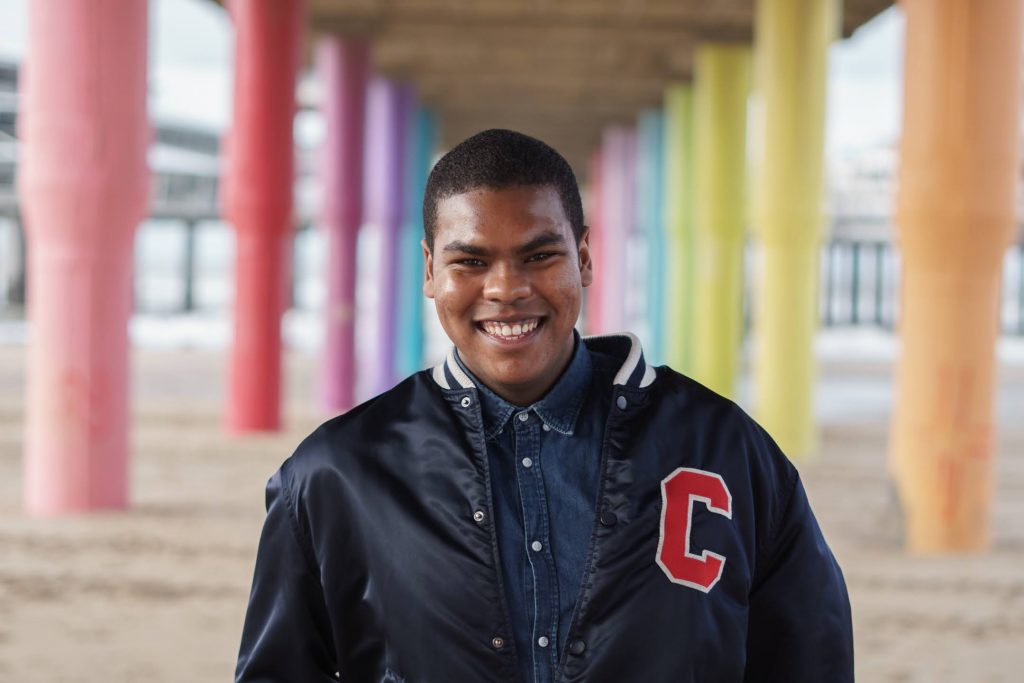‘Everyone can make an impact’
Climate change, plastic in the oceans, species going extinct… We hear a lot of worrying news about the sustainability of our planet every day, but what does it actually mean for you and me? We went out into the streets to talk to you, the generation of the future in The Hague, about sustainability. Does it keep you up at night or not at all? What do you think should be done societally and politically? And what role are you playing to be part of the solution? Evander (18) is the third one to take the floor in this series of Sustainability Stories from The Hague.


Could you please shortly introduce yourself?
‘I am Evander. I am 18 years old and studying International Creative Business at Inholland University of Applied Sciences in The Hague. I love acting, music and editing videos. And I like cooking too. I also love hanging out with my friends and family. With my best friend, I do a lot of walking. Together, we can walk and talk for hours, literally everywhere: from forests to malls.’
What comes to your mind when you think of sustainability?
‘To mind comes the definition of keeping the planet safe enough for future generations. Other associations with the word are nature, no waste and being green. I do not remember when I first learned about it. I think it was in high school where I learned about the greenhouse gas effect, airplane emissions and the warming of the planet. But I also feel I kind of subconsciously know about it. Things such as: you should not throw stuff on the street.’
How do you contribute to a more sustainable world?
‘In my family we separate our waste, turn the lights off when we are not home, try not to waste food and do not consume a ton of meat. For instance, my sister saw a documentary about the meat industry and more specifically about how pork meat is produced. After watching this, she did not want to eat pork anymore. So, we all together stopped eating it as a family. We influence each other in making small efforts.’
And is the topic of sustainability also something you discuss with friends?
‘I think everyone is pretty aware, but still sometimes I see my friends like for example throw cigarettes or food leftovers on the floor. When I see this, I am like: ‘You know there is a bin right over there, so just throw it in there.’
Is waste a topic that is important to you?
‘Definitely. Waste on the streets and there is also a lot of waste in and under the water. Like the other day, a friend of mine and I were sitting at a lake and all we saw at the bottom was different types of plastic things. That is such a shame. It is such a huge issue that I do not really know how to fix it, maybe with policies.’
Can you explain a bit more what you mean with policies?
For instance, what I think Europe can do is get together as a collective because it is pretty big and create some policies that maybe would set an example for the rest of the world. Because Europe is quite a big part of the planet and if we already manage to reduce our carbon footprint, or food and plastic waste, or anything in that direction, I think that would help the planet a lot.’
What do you think of activism?
‘It can have some great impact I think, but it depends on what type of activism. Because I notice that some people are too pushy. For example, on TikTok I saw a woman who is a vegan teacher and she bashes everyone that eats meat. She says that everyone can be vegan, but I don’t believe this as some people might have allergies or other dietary restrictions. And her response to this is: ‘No that is not true. Everyone can be vegan.’ This happens with a lot of things: people shaming others. And when you are shaming people, they are probably going to be more aggressive about it. This does not only apply to sustainability, but also to racial and social issues. And this does not work.’
What do you see as an effective way of changing habits into more sustainable ones?
‘I would say: start when you are little. I feel we need to educate people when they are young. So, when they grow up they already have it in their system. If you explain and encourage a five-year-old for instance to separate waste and continue to repeat this message during their childhood, it grows into a habit. Because I think this is where the issue lies: people getting stuck in old habits. And I definitely think it helps if one person stops doing something unsustainable, as I believe everyone can make an impact.’
